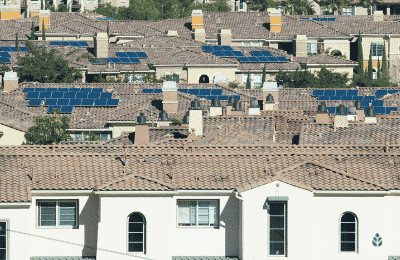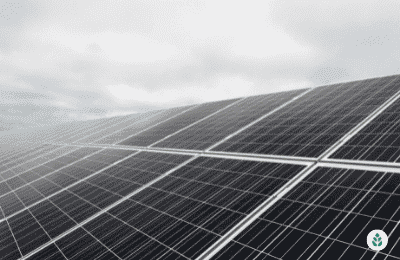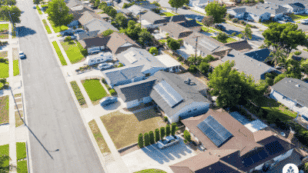
How Much Do Solar Panels Cost in Colorado? (2024 Savings Guide)
In this EcoWatch guide on the cost of solar panels in Colorado, you’ll learn:
- What the average cost of going solar in Colorado is
- How solar system sizes affect installation costs in Colorado
- How Colorado can save money when going solar
- Which local installation companies have the best prices
This guide has helped thousands of Colorado homeowners save time and money when going solar by teaching them exactly what affects installation costs in the Centennial State. Let’s get started!
Each product and or company featured here has been independently selected by the writer. You can learn more about our review methodology here. If you make a purchase using the links included, we may earn commission.
Going solar is usually financially beneficial for most Coloradans, with the average system paying for itself in 13 years and then providing additional net savings of more than $18,000. However, accessing solar is still quite expensive in the state, and understanding costs, potential savings and financing options is crucial for maximizing the benefits of going solar.
In this guide, we’ll be discussing the average cost of solar panels in Colorado. We’ll also cover some factors that can affect your total cost, some tips for saving money on your photovoltaic (PV) equipment and more.
What Will Your Solar Panel System Cost in Colorado?
Solar panels in Colorado cost around $3.52 per watt. Since most Colorado homeowners need a system that’s around 7.5 kilowatts (kW), the typical system totals $26,400 before the federal investment tax credit (ITC) or $18,480 after the credit is applied.
Your price can fluctuate quite a lot for a variety of reasons, one of the most significant being the size of the system you need to offset your energy demands. The table below includes some average pricing and lifetime savings for systems of different sizes, along with the home square footage each size usually corresponds to in Colorado.
| Solar System Size | Energy Use (per month) | House Size (sq ft) | Total Cost | Cost After the Federal ITC | Energy Savings (over 25 years, after system is paid off) |
| 5 kW | 500 kWh | 2,000 | $17,600 | $12,320 | $17,542 |
| 6 kW | 600 kWh | 2,200 | $21,120 | $14,784 | $19,344 |
| 7 kW | 700 kWh | 2,400 | $24,640 | $17,248 | $21,146 |
| 8 kW | 800 kWh | 2,600 | $28,160 | $19,712 | $22,948 |
| 9 kW | 900 kWh | 2,800 | $31,680 | $22,176 | $24,750 |
| 10 kW | 1,000 kWh | 3,000 | $35,200 | $24,640 | $26,552 |
| 11 kW | 1,100 kWh | 3,200 | $38,720 | $27,104 | $28,354 |

Blue Raven Solar
Pros
- Industry-leading in-house financing
- Competitive pricing
- Excellent reputation
Cons
- Doesn't offer solar batteries (coming 2022)

Blue Raven Solar
Pros
- Industry-leading in-house financing
- Competitive pricing
- Excellent reputation
Cons
- Doesn't offer solar batteries (coming 2022)
How Do Colorado’s Solar Prices Compare to the National Average?
Solar equipment in Colorado is just above average in cost on a per-watt basis — around $3.52 — as compared to the rest of the U.S., where the average per-watt price is $3.33. That means that dollar for dollar, you get just slightly less for your money in Colorado in terms of power output.
However, Coloradans use far less electricity per month than most Americans. The average monthly consumption in Colorado is just 711 kilowatt-hours (kWh), according to the Energy Industries Association (EIA), which is about 25% lower than the national average.
This is significant because you need fewer panels and a smaller overall system size to offset the energy consumption in CO than you would in most states, so the total conversion cost is lower. The typical Colorado solar system costs $26,400 before the federal credit or $18,480 after, whereas the national averages are $29,970 and $20,979, respectively.
What Are the Main Factors of Solar System Costs in Colorado?
While the average solar conversion cost in Colorado hovers around $18,500, prices commonly fluctuate between $12,320 and $27,104. There’s more than a $14,000 difference between the low average and the high average because there are a few cost factors that contribute heavily to your total. These include the following:
- Your monthly energy costs
- The efficiency of your solar panels
- Add-on products, like batteries and electric vehicle (EV) chargers
We’ll explain how and how much each of these factors affects the cost of installing solar panels in Colorado in the following sections.
Colorado’s Below-Average Energy Needs
One of the biggest reasons Colorado’s solar panel system prices are so low is that the energy demands in the area are below average. Most Colorado homeowners use around 700 kWh of electricity every month, which is well below the 881 kWh consumed in the rest of the country.
Lower energy demands mean you can get away with less power output from your panels, which translates to fewer panels needed and, consequently, lower installation costs. The average solar array size needed in the U.S. is 9.5 kW, but solar customers in the Centennial State need systems totaling just 7.5 kW.
At the average price per watt in Colorado, the low energy demands yield an average savings of around $5,380 over the array size required by most Americans.
We do still recommend oversizing your system to account for decreased production during Colorado’s frequent snowfall and to prepare for the natural drop in panel efficiency over time. Still, though, low energy demands mean lower overall costs for installation.
The Abundance of Available Sunlight in Colorado
Colorado residents enjoy an average of 300 sunny days per year, which is about 50% higher than the national average. The abundant sunlight means you can very likely get away with installing lower efficiency panels since you’ll still have plenty of production to offset your below-average energy demands.
Panels with a lower efficiency rating tend to be more affordable, especially if you opt for polycrystalline panels over monocrystalline panels. It’s difficult to say exactly how much this will save you, but using averages, you could save around $10,000 initially just by choosing polycrystalline panels with an efficiency closer to 15% than mono panels at 20% or higher.
With that being said, monocrystalline panels last longer and typically come with better warranty coverage. In our opinion, Coloradans should choose a mono panel that comes at a moderate cost. This should provide the best of both worlds: a lower initial cost than the highest-efficiency panels, plus long-term savings on utility bills.
The Popularity of Batteries and EV Chargers in Colorado
Solar batteries and EV chargers are growing in popularity in Colorado, and these can drive up solar panel system installation costs by between $10,000 and $12,000, on average.
Solar batteries are most popular in areas where net metering (NEM) isn’t available because they help improve long-term savings and often pay for themselves. Thankfully, Colorado has one of the best net metering programs in the country, with NEM mandated throughout the state and guaranteed to provide one-to-one credits for each kWh of energy you overproduce.
As such, we recommend you avoid batteries unless you want to be able to maintain power through blackout conditions. Power outages are somewhat common in the area, but in our opinion, the frequency doesn’t justify paying $10,000+ for a solar battery.
EVs are also growing in popularity in Colorado, with experts reporting that 65% of car sales in the state will be EVs by 2030. Paying $1,000 to $3,000 for an EV charger is a great option if you have an EV or plan to buy one, as this will allow you to power your car with self-produced energy and for free. Over time, an EV charger should pay for itself and provide additional savings on the order of hundreds or thousands of dollars over the life of your EV.
Watch Below: Learn How Colorado’s Incentives Make Going Solar More Affordable
Additional Costs of Going Solar in Colorado
Solar panels make up the bulk of your solar conversion costs in Colorado, but there are some other charges you should be aware of before converting to renewable energy. We’ll explain these additional costs below.
- Building permits: Your local building department will require your installer to pull permits for your solar array before any work commences, as permits are required by all municipalities in the state. Permits often come with filing fees, which can range from $25 up to $300 or so, depending on where you live. There was a law passed in Colorado in 2021 that caps the solar permit fees at $500, so that is the maximum you’d pay in any part of the state.
- Product markup and administration charges: Each solar installer in Colorado can opt to mark up your clean energy equipment to turn a profit in addition to labor charges. This markup can add up to hundreds or even thousands of dollars, making it a pretty significant cost factor.
- Additional solar equipment: Prospective solar customers in Colorado often only think about the cost of panels and prominent add-on products, like batteries and EV chargers. However, you’ll also need mounting racks and hardware to attach your panels to your roof, wiring and inverters to connect it to your home and miscellaneous protective equipment, like squirrel guards and conduit. Coloradans get above-average amounts of snow, as well, so snow guards are a common add-on as well. These products can add hundreds of dollars to your system total.
- Interconnection application fee: Finally, local utility companies in Colorado require that you or your installer file for interconnection, which is what allows your system to be grid-tied. Many companies charge an interconnection application fee, which can range from around $25 up to $150 or so.
What Maintenance Costs Can Solar Owners Expect in Colorado?
Most solar customers in Colorado will never have to pay for solar panel maintenance, which is good news after having to pay $18,000+ for the installation.
One service some customers pay for is annual or semiannual panel washing, which removes pollen and dirt from the panel surface to maximize efficiency and production. Since Colorado receives so much sunlight, this usually isn’t necessary. Plus, the above-average snowfall should help keep the panels clean.
Most of the mechanical issues you might run into should also be covered by your solar power system warranty, so it’s unlikely you’ll have to pay for repairs or maintenance throughout the lifespan of your panels.
Which Solar Financing Options Will Help You Save the Most in Colorado?
The solar panel installation companies in Colorado generally offer some subset of the four primary payment options, which include cash purchases, solar loans, solar leases and power purchase agreements (PPAs).
Of the four options, we strongly recommend a cash purchase if you can make it work. Paying in cash means you’ll own your panels instantly, so you’ll see the fastest payback period and the highest energy savings over time. A cash purchase is more accessible in Colorado than in most other states, too, since conversion costs are between $2,000 and $4,000 lower, on average.
If you can’t afford to pay in cash, we recommend going with a solar loan. Financing your solar panels will mean you pay more for your system because of interest, so your payback period will be longer, and your overall savings will be lower. Loans are more accessible, though, because they often don’t require any money upfront.
A solar lease might work for you if you know you can’t afford a cash purchase or if you won’t qualify for a loan. Leases have no initial costs in most cases and less strict credit score requirements.
However, leases come with a few sizable downsides. First, they don’t let you take the federal solar tax credit, and with an average value of over $7,900 in Colorado, that’s a pretty big drawback. Plus, leases don’t lead to panel ownership, so they save you far less over time. They can also be difficult to transfer to new owners if you sell your home, and they generally don’t boost your home value.
A PPA is the option we recommend least often. It’s accessible because it has no initial payment and minimal credit requirements, but leases are almost as accessible and tend to save you a little more money over time. PPAs also don’t let you take the federal credit, and they can make selling your home difficult if the new owner doesn’t want to assume the agreement.
If you’re not sure which payment type will work best for you and you want to keep your options open, we recommend checking out SunPower and Tesla, both of which accept all four payment options. Blue Raven Solar doesn’t accept leases or PPAs, but it does have outstanding and accessible financing available.
We recommend getting started by figuring out how much your solar panels will cost. Our solar calculator will provide an estimate that you can then use to determine which of the options in the table below will be most beneficial to you over time.
| Financing Method | Total 25 Year Savings (estimated) | Initial Costs (estimated, after the ITC) | Monthly Payments (estimated) | Payback Period (estimated) |
| Cash | $18,300 | $18,480 | $0 | 13 years |
| Loan | $13,000 | $0 | $90 to $200 | 17 years |
| Lease | $5,000 | $0 | $90 | N/A |
| PPA | $4,000 | $0 | $90 | N/A |
What Are Other Ways You Can Save When Going Solar in Colorado?
Although the cost of solar panels in Colorado is below the national average, the equipment is still expensive. Luckily, there are a few things you can do to keep your installation total down, including the following:
- Choose a lower-efficiency panel brand
- Avoid solar batteries
- Take advantage of Colorado solar tax incentives and rebates
We’ll explain how each of these strategies can save you money — and approximately how much — in the following sections.
Choose a Lower-Efficiency Panel Brand
In a lot of states, we recommend opting for a high-efficiency panel brand. Doing so will maximize efficiency and production in all situations, which typically yields the greatest solar savings in the long run. However, we don’t feel high-efficiency panels are necessary in Colorado.
The Centennial State sees 300 sunny days annually, which is more than just about any other state. Since sunlight is so widely available and energy usage is well below average, a panel with a lower efficiency rating should suffice, offset your energy consumption and provide savings on your electricity rates.
This is especially the case because the state currently offers one-to-one net metering — also called net energy metering or NEM for short. NEM allows you to produce more energy than you need during the day, which is likely in sunny Colorado, and then use the excess to offset consumption at night when your panels aren’t producing.
All in all, opting for a mid- or low-efficiency panel can save you thousands of dollars upfront and shouldn’t lead to any significant loss of savings over time.
Avoid Solar Batteries
Solar batteries are often tempting for Coloradans because power outages are somewhat common in the state, but we recommend avoiding them unless you need them to power medical equipment or other critical electronics.
Solar batteries offer two primary functions: maintaining power through blackouts and giving you access to effective net metering. Since Colorado has one of the leading net metering policies in the country, we don’t feel the lone upside of powering your home through outages makes them worth it.
Plus, without the benefit of effective net metering, your batteries will never pay for themselves. Overall, we’d recommend skipping batteries for most customers unless the net metering program changes in the future.
Take Advantage of Colorado Solar Incentives
Finally, we suggest you take advantage of as many solar incentives and rebate programs in Colorado as you can.
The state as a whole has very few incentives. These include the federal credit with an average value of $7,920, the state sales tax exemption and property tax exemption for solar equipment with average savings totaling over $1,000 and net metering, which is likely to save you thousands over the life of your home solar system.
However, in place of more robust state incentives, a handful of municipalities, local energy efficiency companies and electric companies offer more local incentives. These include the following:
- Xcel Energy
- Colorado Energy Office (CEO)
- Colorado Springs Utilities
- EnergySmart
- Black Hills Energy
- Holy Cross Energy
- The City of Boulder
- The City of Denver
You can read more about the state and local benefits in our guide to solar incentives in Colorado.
What Are the Typical Costs of Colorado’s Solar Installers?
Your system total will depend on the installer you choose, to some extent, as each company can charge different amounts for equipment and labor. The table below includes some relative pricing and other information for what we believe are the best solar panel companies in Colorado. You can use these prices to get a sense of which providers might work within your budget.
| Solar Company | Superlative | EcoWatch Rating (Out of 5.0) | BBB Rating | Average Cost ($–$$$$$) |
| Photon Brothers | Outstanding Regional Installer | 4.5 | A+ | $$ |
| Blue Raven Solar | Best Solar Financing | 4.5 | A+ | $$ |
| SunPower | Best National Provider | 5.0 | A+ | $$$$ |
| Tesla Solar | Best Solar Technology | 4.5 | A+ | $$ |
| ADT Solar | Best Warranty Coverage | 4.0 | A+ | $$$ |
How Are Solar Costs and Regulations Trending In Colorado?
The Solar Energy Industries Association (SEIA) reports that the cost of residential solar panels in Colorado has dropped by around 53% over the past decade. That means that the average system today, which totals around $18,480 after the federal credit, would have cost closer to $38,000 10 years ago.
This significant dip in pricing is attributed to reduced production costs, thanks in part to a growing demand for solar throughout the country. Since demand is still increasing, we expect the cost of solar panels in Colorado to continue to go down.
As far as incentives and rebates go, there currently are no plans to add new perks or take the existing ones away. With that being said, Colorado’s renewable portfolio standard (RPS) goal was met in 2020 and hasn’t been renewed. Since RPS goals are the primary driver of incentive availability, it’s possible that those currently available will become less attractive in the coming years.
If something does change, we’d expect it to be the net metering program, which has gotten less beneficial in a number of states in the recent past. Homeowners might see a drop in the credit rate or the program disappear altogether.
With prices as low as they have ever been and incentives at risk of getting less appealing in the future, we believe now is the best time to go solar to lock in your incentives. You can use the tool below to get free solar quotes to start planning out your solar project.
Read More About Going Solar
- What Are the Best Solar Installers in Colorado?
- Is it Worth Going Solar in Colorado?
- 2022 Colorado Solar Incentives Guide (Tax Credits, Rebates & More)
The cost information presented in this article is derived from a comprehensive analysis, incorporating data from multiple industry sources. The average cost per watt per state was calculated based on figures from Consumer Affairs, Energy Sage, and Berkeley Lab’s Electricity Markets & Policy Department. Additionally, monthly energy consumption and the average monthly cost of electricity were sourced from the U.S. Energy Information Administration, ensuring a well-rounded and accurate representation of the information presented.
FAQs: Colorado Solar Panel Costs
Given the high demand for solar equipment in Colorado, we get a lot of questions from residents about costs, savings and the process of converting to renewable energy. We’ll answer the most common questions we see in the following sections.
The typical cost of a solar power system in Colorado is $26,400 before the federal tax credit or $18,480 after the credit. These numbers are based on the average local cost per watt of $3.52 and the typical monthly energy demands in the state, which require a 7.5 kW system to be offset.
No, Colorado will not pay homeowners to install solar panels, and companies that advertise this are usually trying to get you to sign a lease or a PPA. Neither of these payment options is advisable, as they don’t let you take the same tax breaks as cash purchases or loans, and they save far less on electric bills over time.
In most cases, yes! If you pay for your system in cash, your panels will save you the total you spend in an average of 13 years. In the remaining 12 years of expected panel life, you should see additional savings totaling $18,300, on average. Colorado’s net metering program and relatively low conversion costs help customers reduce upfront costs and boost savings over time.
Yes, absolutely! Many Colorado homeowners pay $0 per month for electricity because of their solar energy systems. The abundant sun, low electricity costs and great net metering program in Colorado make the state one of the easiest to eradicate utility bills.
Most homeowners throughout the state will need a system of at least 7.5 kW to do so, but some can get away with a smaller 5-kW solar system.
The cost will always be an essential consideration when going solar, but most Colorado homeowners find that energy efficiency is more crucial in the long run. Given the state’s excellent net metering program, high-production panels will usually save you more in the long run, meaning higher costs quickly get paid for by the system’s production.
Related articles
Top Solar Installers in Colorado Cities
Comparing authorized solar partners
-
- Industry-leading in-house financing
- Competitive pricing
- Excellent reputation
- Doesn't offer solar batteries (coming 2022)
A+Best Solar Financing2014Trina Solar, Canadian Solar, SolarEdge, Silfab, SunPower25-year manufacturer warranty; 10-year workmanship warranty, 2-year production guarantee
Having trouble deciding? Click below and use our process to receive multiple quotes instead:

 233k
233k  41k
41k  Subscribe
Subscribe 







